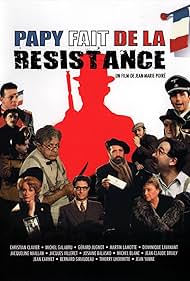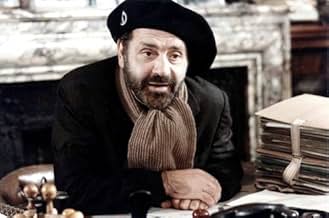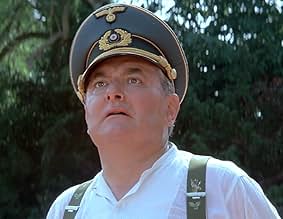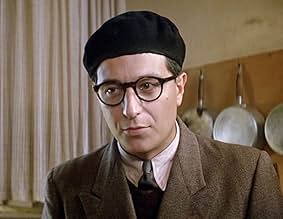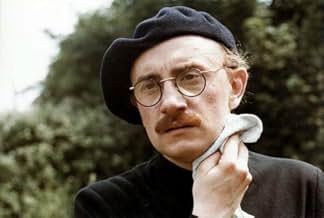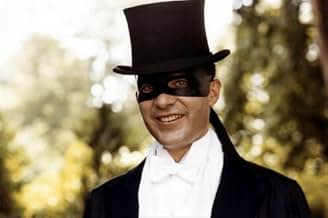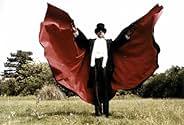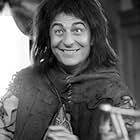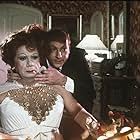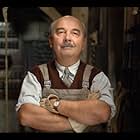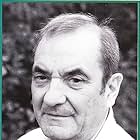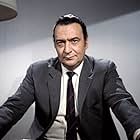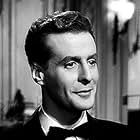Papy fait de la résistance
- 1983
- 1h 42min
VALUTAZIONE IMDb
6,7/10
3495
LA TUA VALUTAZIONE
Aggiungi una trama nella tua linguaBourdelle, a family of musicians, refuse to play for Germans during the war. They would like to liberate France using all possible means.Bourdelle, a family of musicians, refuse to play for Germans during the war. They would like to liberate France using all possible means.Bourdelle, a family of musicians, refuse to play for Germans during the war. They would like to liberate France using all possible means.
Trama
Lo sapevi?
- QuizLouis de Funès was intended to play the role of Papy in the movie but he died before filming commenced. A dedication was given to him at the beginning of the movie : "A Louis de Funès...". But according to the documentary Des Bronzés au Père Noël, la folle histoire du Splendid (2014), he was intended to play the role of Maréchal Ludwig Von Apfelstrudel.
- ConnessioniFeatured in Porte-bonheur: Episodio #1.1 (1983)
Recensione in evidenza
1983 started sadly for French cinema, the heart of Louis de Funès, that was endlessly pumped of a manic energy that enchanted kids and adults for thirty years, succumbed to a fatal stroke. After Fernandel and Bourvil, his death closed the most glorious chapter of French comedy.
But laughs didn't stop for all that, and left the door open for the new generation. And the most emblematic group of this comical New Wave was the 'Splendid' actor's troop (from the name of the café-theater they started in), with such names as Clavier, Jugnot, Balasko, Lhermitte, they would define a new brand of French comedy, based on realistic humor and the elevation of losers and outcasts to the rank of pop-culture icons. And in 1983, they had already competed with De Funès on the box-office field (and honorably lost).
The Splendid Troop made the 'French Fried Vacation" series, with a first opus set in Club Med, and the second in the mountain, then they would make the hilarious "Santa Claus is a Bastard", a magnificent satire about Christmas spirit and its unlikely mixing with loneliness, poverty and depression. After Patrice Leconte, this third movie would be directed by Jean-Marie Poiré, another significant name of French comedy, and the result was such a success that they teamed-up the year after, and for another classic set during the darkest hours of French history: "Gramps is in the Resistance".
But if anything, "Gramps" is a story of a missed opportunity, the film was supposed to feature De Funès. What a splendid tribute to the old generation, and a touching torch- passing moment it would have been had fate not decided otherwise, and this is why the film opens with these beautiful words: to Louis de Funès. And as a fitting homage, many actors who worked with him were cast in the film. From Jean Carmet who plays the heroic father to Jacqueline Maillan who plays his wife, the great operatic singer Héléna Bourdelle aka "La Bourdelle" and even Julien Guiomar who played his eternal rival Tricatel in "Breast or Leg?".
The casting doesn't waste any character and reminds of another star-studded and cameo-filled WWII film: "Is Paris Burning?", the tag-line even says tat the film cost more than the landing on Omaha Beach. But there's more in the film than a simple spot-the-star game. You never feel it forced or useless, the story is remarkably multi-layered until a grand finale reassemble all the pieces of the puzzle, and each actor plays his part remarkably without trying to steal the show. And the writing doesn't indulge to cheap gags, some parts make you smile, not laugh, but their purpose is to expose characters and their personalities. At the end, you genuinely care for them, hell, you even feel sorry for the traitor.
But the heart of the story lies within this Bourdelle family. The father dies early in the film, but since he dies from the first gag, it's rather late, but it's so funny it was worth it. That's the secret of the writing, there are no five minutes without a funny moment and your patience is always rewarded. The daughter of La Bourdelle is Bernadette, a violinist played by Dominique Lavanant, she's a fervent fan of De Gaulle, and she's engaged, not so passionately, to the Bourdelles' tenant, Michel Taupin, played by Christian Clavier, a nerdy guy who fails to exude the resistant vibes. And then there's Grampa played by De Funès' long-life accomplice, Michel Galabru, an ex-doctor and WWI veteran, who behaves like a modern version of Abe Simpson.
To complete the family picture, there's Martin Lamotte as the effeminate hairdresser whose flaming and sassy mannerisms are so over-the-top that they work as the perfect cover for his real identity. It's even more crucial since the family live in the opera back-rooms when General Herman Spontz became the new resident. Roland Giraud is the General, and surprisingly, doesn't act like a typical movie Nazi, he's fond on Bernadette and his charm operates so efficiently the contradiction becomes interesting. We're not dealing exactly with a movie that expose things in black and white.
This attitude from the writers contributes to one of the film's best running gag; Jugnot as Adolfo Ramirez, the collaborator so zealous to please the Kommandantur, so eager to scream a hilarious "Heil" with his high-pitched voice that he inspires the Nazis more contempt and suspicion than sympathy. At the end, he's the one being arrested although he's only trying to help 'Ze Germans". This character illustrates the absurdity of a war where French people acted more Germanly than Germans. And Jugnot was born to play this part, with his average guy physique, mustache and bald head, he magnificently turns into derision his ungrateful traits.
The film takes you from a poignant scene with fighters about to be shot (Giraudeau in the shorter role of the film) to savior named Super Resistant, a sort of Arsène Lupin like figure who's one of the film's best inventions. It climaxes with the last-minute performance of Jacques Villeret as Hitler's brother-in-law Maréchal Van Apfelstrudel, who gives an unforgettable musical moment, one that would carry some strange nostalgic, almost sad, resonance. As if the film was as pivotal for French comedy as its setting for French history.
And if you love comedies because they catch you off-guard, then get ready for a superb twist. I won't spoil it but let's say it's one of these masterstrokes that proved that there was more intelligence under the parody facade. Collaboration or resistance is one of France's most painful memories and from the way it is questioned, even mocked, earned "Gramps is in the Resistance" its significance in French Cinema.
Speaking of which, 1983 might have had a sorry start but the film was the best way to pay tribute to De Funès, the "Gramps" of Comedy.
But laughs didn't stop for all that, and left the door open for the new generation. And the most emblematic group of this comical New Wave was the 'Splendid' actor's troop (from the name of the café-theater they started in), with such names as Clavier, Jugnot, Balasko, Lhermitte, they would define a new brand of French comedy, based on realistic humor and the elevation of losers and outcasts to the rank of pop-culture icons. And in 1983, they had already competed with De Funès on the box-office field (and honorably lost).
The Splendid Troop made the 'French Fried Vacation" series, with a first opus set in Club Med, and the second in the mountain, then they would make the hilarious "Santa Claus is a Bastard", a magnificent satire about Christmas spirit and its unlikely mixing with loneliness, poverty and depression. After Patrice Leconte, this third movie would be directed by Jean-Marie Poiré, another significant name of French comedy, and the result was such a success that they teamed-up the year after, and for another classic set during the darkest hours of French history: "Gramps is in the Resistance".
But if anything, "Gramps" is a story of a missed opportunity, the film was supposed to feature De Funès. What a splendid tribute to the old generation, and a touching torch- passing moment it would have been had fate not decided otherwise, and this is why the film opens with these beautiful words: to Louis de Funès. And as a fitting homage, many actors who worked with him were cast in the film. From Jean Carmet who plays the heroic father to Jacqueline Maillan who plays his wife, the great operatic singer Héléna Bourdelle aka "La Bourdelle" and even Julien Guiomar who played his eternal rival Tricatel in "Breast or Leg?".
The casting doesn't waste any character and reminds of another star-studded and cameo-filled WWII film: "Is Paris Burning?", the tag-line even says tat the film cost more than the landing on Omaha Beach. But there's more in the film than a simple spot-the-star game. You never feel it forced or useless, the story is remarkably multi-layered until a grand finale reassemble all the pieces of the puzzle, and each actor plays his part remarkably without trying to steal the show. And the writing doesn't indulge to cheap gags, some parts make you smile, not laugh, but their purpose is to expose characters and their personalities. At the end, you genuinely care for them, hell, you even feel sorry for the traitor.
But the heart of the story lies within this Bourdelle family. The father dies early in the film, but since he dies from the first gag, it's rather late, but it's so funny it was worth it. That's the secret of the writing, there are no five minutes without a funny moment and your patience is always rewarded. The daughter of La Bourdelle is Bernadette, a violinist played by Dominique Lavanant, she's a fervent fan of De Gaulle, and she's engaged, not so passionately, to the Bourdelles' tenant, Michel Taupin, played by Christian Clavier, a nerdy guy who fails to exude the resistant vibes. And then there's Grampa played by De Funès' long-life accomplice, Michel Galabru, an ex-doctor and WWI veteran, who behaves like a modern version of Abe Simpson.
To complete the family picture, there's Martin Lamotte as the effeminate hairdresser whose flaming and sassy mannerisms are so over-the-top that they work as the perfect cover for his real identity. It's even more crucial since the family live in the opera back-rooms when General Herman Spontz became the new resident. Roland Giraud is the General, and surprisingly, doesn't act like a typical movie Nazi, he's fond on Bernadette and his charm operates so efficiently the contradiction becomes interesting. We're not dealing exactly with a movie that expose things in black and white.
This attitude from the writers contributes to one of the film's best running gag; Jugnot as Adolfo Ramirez, the collaborator so zealous to please the Kommandantur, so eager to scream a hilarious "Heil" with his high-pitched voice that he inspires the Nazis more contempt and suspicion than sympathy. At the end, he's the one being arrested although he's only trying to help 'Ze Germans". This character illustrates the absurdity of a war where French people acted more Germanly than Germans. And Jugnot was born to play this part, with his average guy physique, mustache and bald head, he magnificently turns into derision his ungrateful traits.
The film takes you from a poignant scene with fighters about to be shot (Giraudeau in the shorter role of the film) to savior named Super Resistant, a sort of Arsène Lupin like figure who's one of the film's best inventions. It climaxes with the last-minute performance of Jacques Villeret as Hitler's brother-in-law Maréchal Van Apfelstrudel, who gives an unforgettable musical moment, one that would carry some strange nostalgic, almost sad, resonance. As if the film was as pivotal for French comedy as its setting for French history.
And if you love comedies because they catch you off-guard, then get ready for a superb twist. I won't spoil it but let's say it's one of these masterstrokes that proved that there was more intelligence under the parody facade. Collaboration or resistance is one of France's most painful memories and from the way it is questioned, even mocked, earned "Gramps is in the Resistance" its significance in French Cinema.
Speaking of which, 1983 might have had a sorry start but the film was the best way to pay tribute to De Funès, the "Gramps" of Comedy.
- ElMaruecan82
- 18 apr 2016
- Permalink
I più visti
Accedi per valutare e creare un elenco di titoli salvati per ottenere consigli personalizzati
- How long is Gramps Is in the Resistance?Powered by Alexa
Dettagli
- Data di uscita
- Paese di origine
- Lingue
- Celebre anche come
- Gramps Is in the Resistance
- Luoghi delle riprese
- Immeuble, Rue Berryer, Paris 8, Parigi, Francia(a few scenes)
- Azienda produttrice
- Vedi altri crediti dell’azienda su IMDbPro
Contribuisci a questa pagina
Suggerisci una modifica o aggiungi i contenuti mancanti

Divario superiore
What is the German language plot outline for Papy fait de la résistance (1983)?
Rispondi